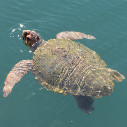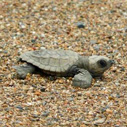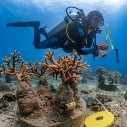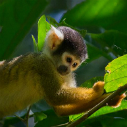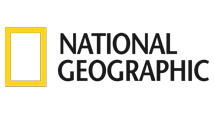Marine and Coastal Conservation Volunteering (age 18+)
Greece
The Marine and Coastal Conservation project researches and monitors the vital seagrass meadows and sand dune systems that can be found around the beautiful island of Kefalonia in Greece.
Volunteers get involved in hands on research, exploring and assessing the sand dunes on land and through drone surveys, and in-water snorkelling surveys of the seagrass meadows. Volunteers help to keep the beaches clean, recording plastics and other debris.
You’ll be living on the friendly Greek island of Kefalonia, with its sandy beaches, rugged scenery and surrounded by the warm crystal blue waters of the Ionian Sea.
Join the team and help protect these critical ecosystems that are so important maintaining biodiversity as well as tracking and mitigating climate change.
Key Info
View More PhotosProject Information
Volunteer role: What will I be doing?
The project studies seagrass meadows and sand dunes along the coast of Kefalonia. These ecosystems are categorised as vulnerable on the IUCN Red List.
Volunteers support the work of the local conservation team and take part in the following tasks:
- Snorkelling surveys of the seagrass meadows
- Assessing geotagged photos of the seagrass meadows to classify the sea floor
- Sand dune habitat surveys, species identification and vegetation studies
- Sand dune litter surveys - recording and collecting litter and debris
- Drone surveys – assisting the team’s drone pilot and reviewing footage to create topographic and 3D maps
- Overnight light pollution surveys on the beach
- Data review and entry to databases
- Bird surveys which contribute to Cornell University's e-Bird citizen Science online database (South Coast Field Station only)
You will learn about the importance of documenting, protecting and tracking changes to ecosystems and the impact of climate change and human activities.
You should be a confident swimmer who has tried snorkelling before. The seagrass meadow research is carried out by snorkelling on the surface of the sea, wearing a life jacket, in waters of up to 8m deep. Volunteers are monitored by a safety supervisor on a paddleboard and snorkel shifts will only take place in suitable sea and weather conditions. Occasionally there may be surveys by kayak instead of snorkelling. Surveying involves taking photos and recording GPS, depths and other properties of the sea environment.
You will need to cycle to some of the survey sites so you should be comfortable riding a bicycle on hilly terrain (helmets and safety vests are provided).
Typical day
At the start of your first week, you will be fully briefed on the project and receive training in the research procedures and techniques that you will use, including GPS, sea meadow research, data entry and photo classification.
Working days consist of a morning shift and an afternoon shift of around 2-4 hours each, with the middle of the day free to rest and relax. Mornings with sand dune or bird surveys start early at around 5.30am and the afternoon shift finishes between 6-7pm. You will need to work, walk and cycle during hot days. There is also a night beach survey each week to monitor light pollution where you will work on the beach during the night.
Volunteers have 1 or 2 days off in their first week and 2 days off in following weeks. During your free time, you can explore the many attractions of the island or simply relax on the beaches near the volunteer accommodation!
Field Stations
The project has two different field stations, each with its own volunteer accommodation and research focus in different areas of the island.
Here are sample work rotas for each Field Station:
East Coast Field Station
The East Coast Field Station is ideally positioned between the stunning beaches of Skala and Mounda that volunteers monitor.
The popular town of Skala is just over 2km away and has a long golden beach with beach bars, shops and tavernas to enjoy, beach volleyball and water sports. Mounda beach is 1.5km away is known for its tranquillity and turquoise waters. Volunteers either walk, cycle or get a taxi to these beaches.
South Coast Field Station
The South Coast Field Station accommodation is located in Svoronata with the soft sandy beach of Ammes only a five-minute walk away and other beaches and sand dunes a short cycle away.
Svoronata is a quaint beach town with several traditional Greek tavernas and restaurants. The local bus goes daily to the island capital Argostoli which is the perfect place for exploring in the evening with a lovely harbour front, bustling town square, shopping streets, restaurants grocery stores and fresh fruit markets.
Why the work is so important
The seagrass meadows are a larger carbon sink than the rainforest and play a critical role in mitigating climate change. They form an important ecosystem, providing vital habitats and nursery grounds for turtles, fish and lots of other marine life and organisms.
Sand dunes and their vegetation form coastal protection between sea and land. They are a specialised ecosystem for many species including nesting turtles and rare dune vegetation. The dunes are under threat from development and climate change leading to degradation and erosion. The beaches in the area are affected by light pollution from hotels, street lights and restaurants so volunteers monitor the light pollution overnight in teams with the aim to help protect the areas affected by the light pollution.
Other volunteers
There are usually 12-22 volunteers at the East Coast Field Station and 8-16 volunteers at the South Coast Field Station, numbers vary throughout the season. In July and August, this project is popular with volunteers aged 18-25.
If you are coming with a friend or partner, please let us know so that we can book you onto the same field station and can try to schedule you the same days off and we can request for you to stay in the same room (subject to availability and rooms are normally single gender).
Once you are booked on, you’ll get access to a Facebook group for all Marine & Coastal Conservation volunteers, so you can get in touch with others if you would like to.
Duke of Edinburgh’s (DofE) award
This placement has been approved by the DofE as meeting the requirements for the Residential section of the Gold Award.
Local support
You will be working alongside the local team, including field leaders and assistants. Staff live alongside volunteers in the field stations.
“Without the help of volunteers we wouldn’t be able to sustain the ongoing research and assessment of these vulnerable ecosystems which are so important for our planet” Nikos, Program Director
Accommodation
There are two separate volunteer field stations, South Coast and East Coast, each with its own volunteer accommodation.
East Coast Field Station
This is a self-catering volunteer house surrounded by fruit and olive trees, giving lots of shade and space to relax. The house has simple furnishings and a communal cooking and living area. Each bedroom accommodates up to 4 volunteers and there is a shared bathroom. There is basic Wifi.
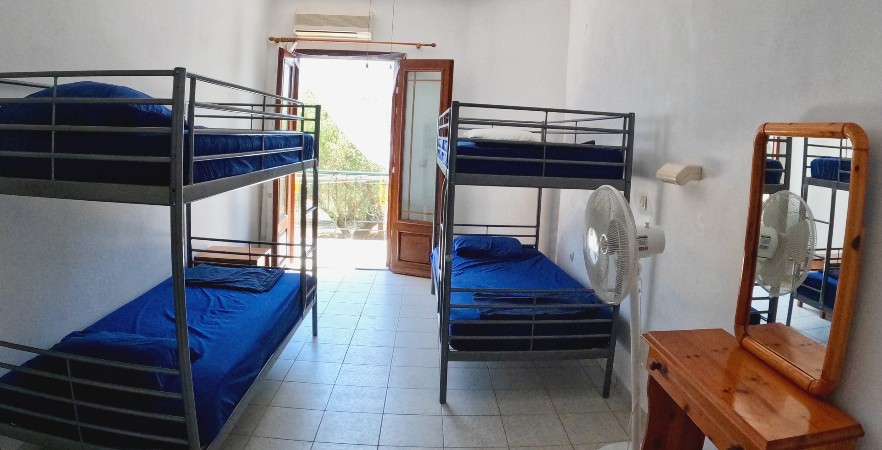
The house is ideally positioned between the two main coastal areas that will be monitored and the stunning beaches of Skala and Mounda.
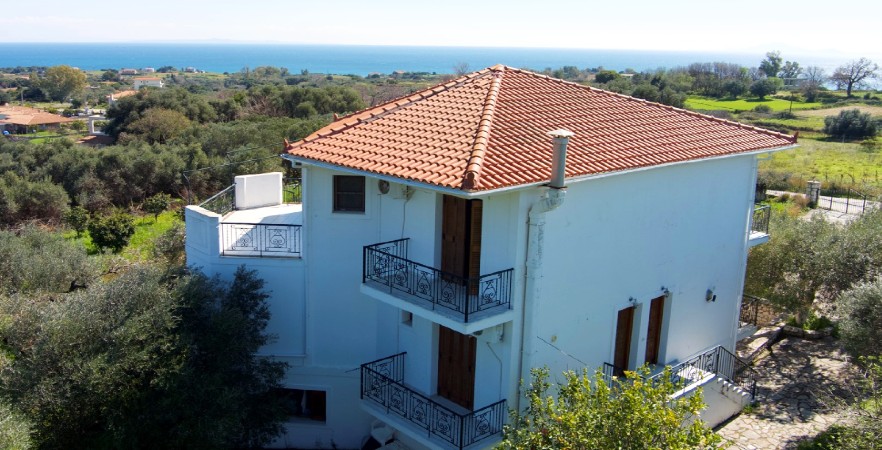
South Coast Field Station
Volunteers share a room in accommodation near the coast with a shaded pretty garden. The accommodation is separated into apartments, each with a couple of bedrooms, a kitchenette and a small living area. Each bedroom has two single beds which friends or couples can request to share. There is basic Wifi.
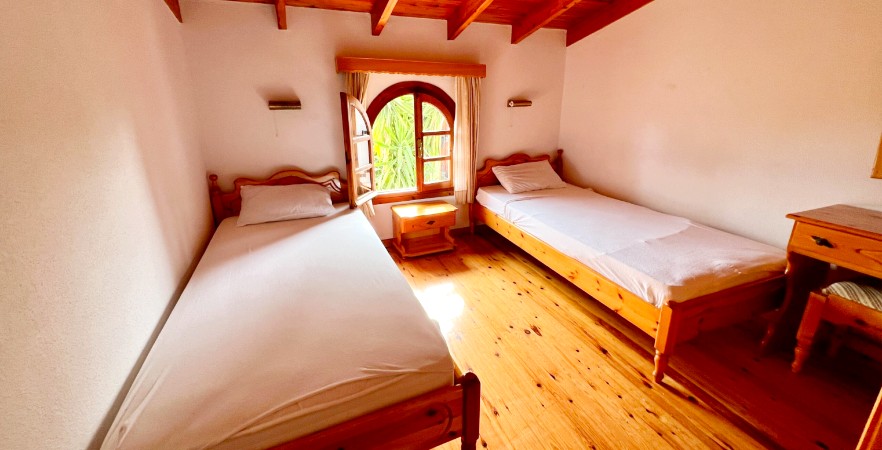
The accommodation is located in the quaint beach town Svoronata and the beautiful soft sandy beach of Ammes is only a five-minute walk away.
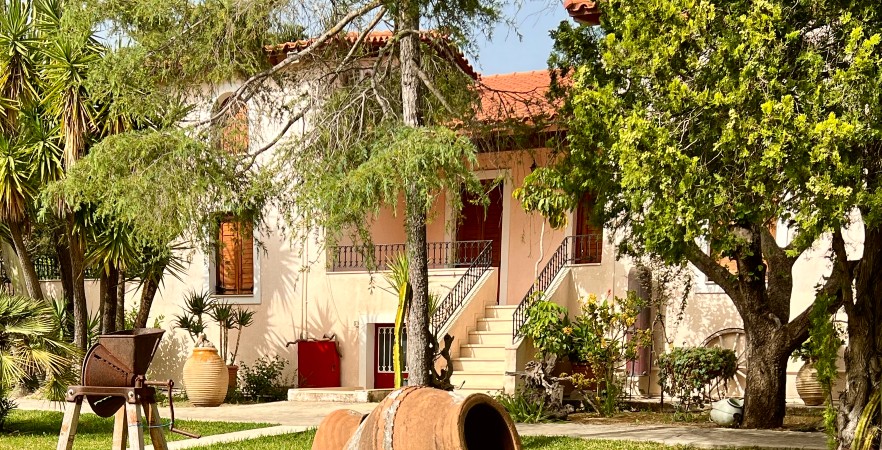
Meals
Meals are not included at either base, but there is an option to pay for catered meals at the South Coast Field Station - vegetarian meals can be provided 5 days a week for an additional cost.
At both field stations volunteers can prepare their own meals and are able to buy groceries locally. You may also like to visit some of the local restaurants, get pizza delivery or order some souvlaki (traditional grilled kebab) for an evening meal on the beach!
There are options at local stores for vegetarians, vegans and other dietary requirements.
Here are typical examples of the food you could have:
- Breakfast - Greek yoghurt with honey, toast with jam and banana or apple
- Lunch and dinner vary throughout the week and can include – pasta, grilled sandwich, tomato and green bean stew, moussaka, pasta salad, lentil bake
The water on Kefalonia is safe to drink or you can buy bottled water.
Getting there
You will need to fly into Kefalonia (EFL).
You will be met on arrival at Kefalonia Airport and transferred your accommodation. The South coast accommodation is around 5 minutes' drive from the airport and the East coast field station is about 1 hour's drive from the airport.
Location and free time
Kefalonia is an popular island in the Ionian Sea, west of mainland Greece.
When not working, volunteers enjoy socialising together and regularly have movie nights, quiz nights and get creative with henna designs. It’s also nice to head into town and have a meal out.
Volunteers have 1 or 2 days off in their first week and 2 days off each additional week to relax and explore the island.
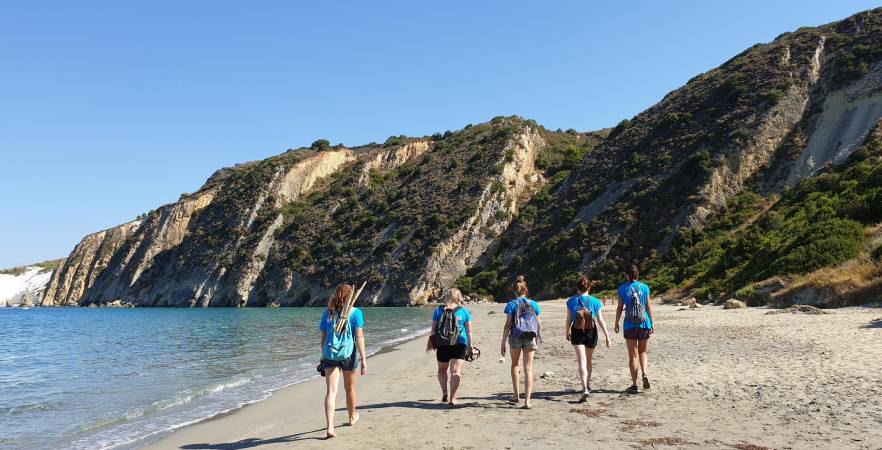
Climate
Kefalonia has a Mediterranean climate with mild, rainy winters and dry, hot summers with long sunny days. From May-October, temperatures range from around 24 to 30+°C, peaking in July and August.
Travelling in and around Kefalonia
Popular activities in Kefalonia that you might like to combine with your project are:
- Beach heaven – beautiful beaches to explore, including Xi beach with its reddish sand and clay that people use as face masks for a homemade spa day!
- Caves, lakes and mountains – there are ancient caves to visit with stalactites, azure blue waters and underground chambers. Mount Ainos is the highest point on the island and a national park with lots of biodiversity and stunning views
- Sea kayaking, snorkelling and scuba diving. Enjoy crystal clear and warm, see the abundant local marine life or go deeper and dive the sunken wrecks of submarines and landing craft from WWII
- Island hopping – the islands of Ithaca, Lefkas and Zante are a ferry ride away or can be visited via day trips on tourist boats
For more information on Greece and some of the things we loved when we visited there please see our Greece country page.
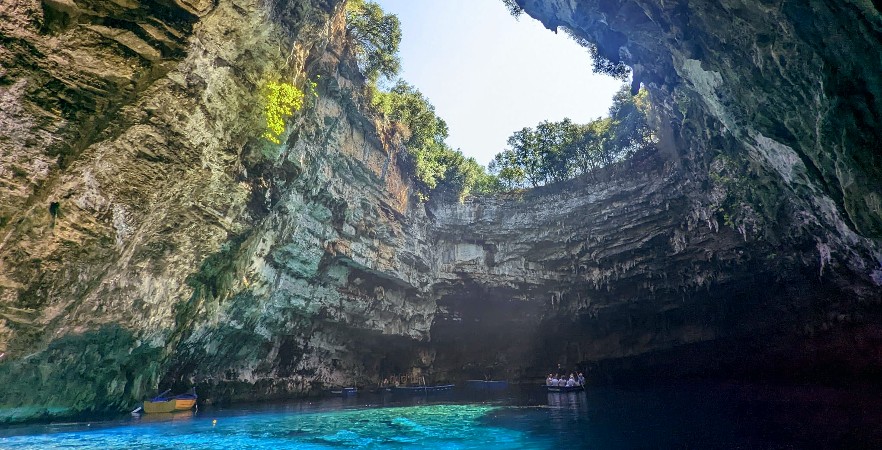
The minimum age for this project is 18 years old and the minimum duration is 2 weeks.
Arrival & departure
- Start day (day to arrive in Kefalonia): Thursday, see available start dates below
- Departure day: Thursday
Durations
You can volunteer at this project for: 2 weeks (14 nights), 4 weeks (28 nights).
Start dates
2026:
- East Coast: 4 Jun, 18 Jun, 2 Jul, 16 Jul, 30 Jul, 13 Aug, 27 Aug, 10 Sep
- South Coast: 21 May, 4 Jun, 18 Jun, 2 Jul, 16 Jul, 30 Jul, 13 Aug, 27 Aug, 10 Sep, 24 Sep, 8 Oct
What's Included
Included
- Dedicated Pod Volunteer specialist to support you from booking on until you complete your trip
- Comprehensive trip planning guide
- Private Facebook group for Marine & Coastal Conservation volunteers
- Kefalonia airport pick up and transfer to accommodation
- Transfer from accommodation to Kefalonia airport on departure
- Accommodation
- Induction and training
- T-shirt
- Life jacket and fins for snorkelling
- Support from the team onsite in Greece
- 24/7 emergency support from the Pod Volunteer UK team
- Donation to Pod Environmental Fund tackling climate change
- 100% payment protection through ABTOT
- Volunteering certificate and reference (on request)
Not included
- Flights
- Travel insurance
- Vaccinations
- Mask & snorkel
- Living costs - meals, snacks, drinks, laundry
- South Coast Field Station meals option - 3 meals a day / 5 days a week for additional fee of €75 Euro per week
- Any tourist trips / activities you choose to do in your free time
Price table
| 2026 - May & Oct start dates - 2 weeks | £799 | GB Pounds |
| 2026 - Jun, Jul, Aug & Sep start dates - 2 weeks | £849 | GB Pounds |
| 2026 - extra 2 weeks | £799 | GB Pounds |
Discounts
- £50 discount if you have previously volunteered with Pod Volunteer
Where the money goes - financial transparency
Your fee covers the overseas costs of volunteering and the costs of running our organisation in the UK, on a non-profit basis. For more details and a breakdown of our costs please click here.
Book with confidence - financial protection
All monies paid to us are financially protected through The Association of Bonded Travel Organisers Trust Limited (ABTOT).
Fees in currencies other than GBP are indicative only and volunteers are invoiced in GBP. For current exchange rates please see www.xe.com
Read volunteer reviews from the Marine Conservation project
William - 2025
"I joined the Marine Conservation project in Kefalonia with Pod Volunteer, and it was an amazing experience from start to finish. Each day offered something new — from seagrass and sand dune monitoring to bird surveys and beach profiling. The variety of fieldwork made every day rewarding, and it was great to see how each task contributed to the wider conservation effort.
The team were incredibly supportive and knowledgeable, creating a friendly and purposeful atmosphere throughout. It was also a great opportunity to meet people from different backgrounds who all shared an interest in protecting the environment.
Overall, it was a fulfilling and eye-opening experience that combined meaningful conservation work with the chance to explore a beautiful part of Greece. I’d highly recommend it to anyone who wants to learn, contribute, and be part of something positive."
Tom
"I have really enjoyed my 2 weeks. It has been interesting learning about the different data collection methods. The shifts have been enjoyable, my favourite shifts include the snorkelling shifts and drone surveys. I have met lots of great people whilst I have been here. The program is run very well and on arrival, we were provided with lots of interesting information.On my days off I visited Poros, Sami, Fiskardo, Argostoli and Zante."
Jess
"The past two weeks in Greece has been an incredible experience that I will treasure for the rest of my life. This is the first time I have travelled without friends or family but the other volunteers and the staff were so welcoming when we arrived that it immediately felt like home. I arrived in Kefalonia with no experience in marine conservation or anything in a similar field but the past two weeks have been full of learning and taught me so much about the importance of protecting these ecosystems and the impact they have on the rest of the world."
Eden
"I have absolutely loved the past 2 weeks in Kefalonia. I have learnt so much about marine conservation and research which is vital for my course. It has made me fall in love with the ocean even more and exploring the beautiful Greek wildlife. I have also learnt so much about myself, it has been a life experience which I will treasure forever. I have made friends for life, and the interns and volunteers have really made the experience the best possible."
Olivia
"I have spent the last 2 weeks in Kefalonia and enjoyed every second. The balance between actively going out and finding the data yourself and inputting the data into programs and spreadsheets really makes you appreciate what you are doing here. I have made some amazing friends who I will keep in contact with all the time now and I am already looking forward to coming back."
Kaitlyn
"My two weeks have been unforgettable. Not only have I gained incredible experience with a variety of marine conservation efforts, but I have also discovered so much about myself and the importance of taking a journey. Arriving here, I instantly felt at home with the interns and other volunteers, all of whom made this experience so much more memorable. Discovering the culture and natural beauty of the Greek islands has been a highlight of this trip. I could not have chosen a better program to be a part of while taking my first trip overseas."
Camilla
"We never expected to have such an amazing summer spending 4 weeks. Our overall experience was so diverse, making friends, exploring neighbouring islands, doing fun and impactful work, spending time in the sea as well as the beautiful villa, seeing Greek culture and most importantly contributing to a project that everyone involved really cares about. We loved learning about the ecosystems around Kefalonia and knowing the data we collected will help to preserve them in the future made it extremely rewarding."
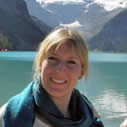
24/7 support
Gemma and the Pod UK team are here to help you throughout your trip
Reserve your place and start your volunteering adventure to Greece!
BOOK NOWSIMILAR PROJECTS
Here are other popular projects you may be interested in



